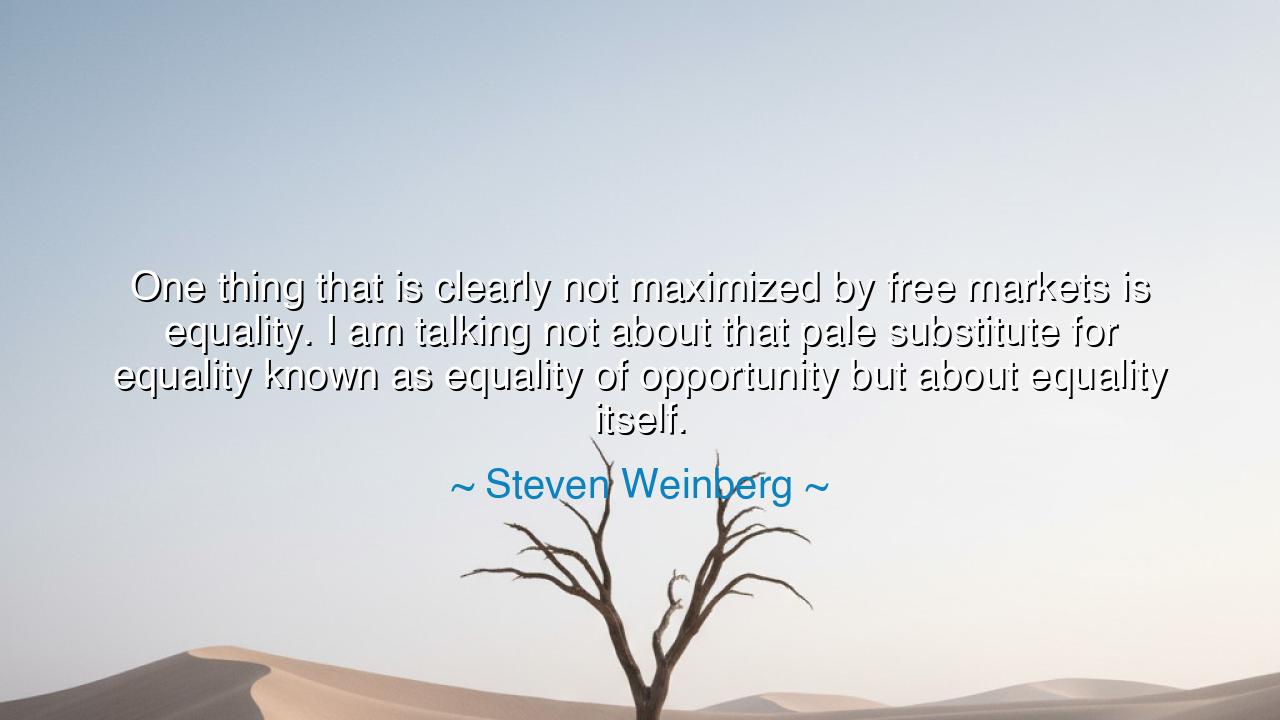
One thing that is clearly not maximized by free markets is
One thing that is clearly not maximized by free markets is equality. I am talking not about that pale substitute for equality known as equality of opportunity but about equality itself.






One thing that is clearly not maximized by free markets is equality—a powerful statement, indeed, that reverberates with the weight of truth. These words, spoken by the great Steven Weinberg, touch upon an ancient and eternal struggle—the yearning for equality. In the world of commerce, of profit and loss, of competition and survival, equality is often relegated to the status of an ideal, a distant dream rather than a living, breathing reality. The free market, which champions the power of the individual to rise and fall according to their abilities, has brought great wealth and progress to many. But in doing so, it has also bred inequality—a stark reminder that the fruits of such a system are not evenly distributed. In this, Weinberg speaks not just of economics, but of the very heart of society: the deep, unyielding desire for fairness and justice.
Equality of opportunity, as Weinberg distinguishes, is a noble but flawed substitute. The free market promises that anyone, regardless of their origin or circumstance, can rise to greatness through hard work and ingenuity. Yet, the reality of this promise is often far more complex. True equality does not merely lie in the opportunity to compete; it lies in the outcome—the realization that every person, regardless of their starting point, should be afforded the same access to the resources, rights, and dignity they need to thrive. The free market, in its drive for profit, is indifferent to these deeper needs. It rewards those who are already well-positioned, leaving behind those who begin with less, even if their potential is equally vast.
The history of the United States provides a stark example of this dynamic. In the aftermath of the Civil War, the notion of freedom and equality was enshrined in the Emancipation Proclamation, yet the realities of life for African Americans were far from equal. The marketplace promised opportunity—but for many, that opportunity was constrained by the shackles of segregation, poverty, and systemic racism. Even with the legal end of slavery, the economic system remained stacked against those who had been oppressed for centuries. The free market allowed for the rise of great fortunes, but it also deepened the divisions between the haves and the have-nots. True equality could not be achieved through market forces alone. It required intervention, the reimagining of systems that prioritized not only profit but the welfare and dignity of all individuals.
Consider, too, the rise of the industrial revolution, when vast wealth was created, yet the laborers—many of whom toiled in grim factories for long hours—remained destitute. The free market had indeed maximized profit, but it had also amplified inequality. The wealthy elite grew richer while the poor suffered in conditions that seemed designed to strip them of their humanity. It was not the equality of opportunity that they lacked; it was the very equality of being—the recognition of their worth as human beings deserving of fair compensation, dignity, and a voice in the shaping of their own lives.
It is in this light that Weinberg's words take on their full weight. Equality itself, not just the opportunity to compete, is what is truly missing in a world driven by the free market. The market, by its very nature, rewards those with resources and power, and it often punishes those without. It is a system that values success above all else, but in doing so, it overlooks the very human costs of that success. True equality—the idea that every person should have the same access to the means of a dignified life, to opportunities for growth, and to a voice in the shaping of their world—cannot be realized in such a system without significant reform.
The lesson here is clear, O seekers of justice: the pursuit of equality is not merely a matter of creating opportunities for all to compete; it is a matter of ensuring that all people, regardless of their birth or their station, have the means to thrive. Equality is not a luxury to be granted only to the fortunate few who rise to the top through their own merit, but a right of all, ensuring that no one is left behind in the race of life. It is a call to reshape our systems—not only in economics but in every facet of society—to value people not for their ability to accumulate wealth, but for their inherent worth as human beings.
As you walk the path of life, remember that true equality requires more than just the illusion of opportunity. It demands a commitment to creating systems that are just, that uplift every person, and that recognize the intrinsic dignity of all. Seek out ways in your own life to challenge the structures that perpetuate inequality—whether in your workplace, your community, or your nation. Advocate for policies that ensure fair wages, that support the most vulnerable, and that create pathways for all people to reach their fullest potential. Stand firm in the knowledge that the fight for equality is not a battle for a distant utopia, but a struggle that can be fought—and won—today. Only then will we begin to see a world where equality is not a dream, but a living, breathing reality.






AAdministratorAdministrator
Welcome, honored guests. Please leave a comment, we will respond soon